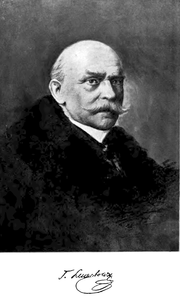Teofil Lenartowicz
| Teofil Lenartowicz | |
|---|---|
 |
|
| Born |
27 February 1822 Warsaw, Poland |
| Died | 3 February 1893 (aged 70) Florence, Italy |
| Occupation | Poet, publicist, ethnographer |
| Nationality | Polish |
| Literary movement | Romanticism |
Teofil Aleksander Lenartowicz (27 February 1822 in Warsaw – 3 February 1893 in Florence) was a Polish ethnographer, sculptor, poet and Romantic conspirator. Linked to Bohemians among Warsaw intellectuals, Lenartowicz was associated with Oskar Kolberg and Roman Zmorski in the anti-Tsarist independence movement, and participated in the Greater Poland Uprising of 1848 during his stay in Kraków. While in exile he taught Slavic literature at the University of Bologna, composed patriotic and religious poems, as well as lyrical and historical epics based on the folklore of his beloved region of Mazowsze. He did portrait-sculptures, and designed tombstones.
Teofil Aleksander came from the master mason family of Lenartowicz Pobóg coat of arms. He was the son of Karol and Maria née Kwasieborska Cholewa coat of arms. While in Florence, he married sculptor Zofia Szymanowska Młodzian COA, with whom he had a son John (Jan). His remains were brought from Italy to Poland and interred in the Crypt of the Distinguished in the St. Stanislaus Church at Skałka in Kraków.
Owing to his fascination with the folklore of the Polish Masovia (which Lenartowicz used as the chief motif of his poetry), he used to call himself Mazurzyna, a versifier of Masovia region. He was friends with Elżbieta Bośniacka, a playwright, poet and journalist associated with Dziennik Literacki.
The best-known of his poems is "The Golden Cup" ("Złoty kubek", 1853), based on a traditional Polish Christmas carol, in which an orphaned girl asks the heavenly goldsmith to make her a golden cup from golden apples and leaves fallen from the golden apple-tree. The cup is to be decorated with engravings depicting the idealized Polish countryside. Because of its symbolism of transcendent light, the poem can be interpreted in different ways, including as advice on art-making. It was favorably received by Norwid, as well as by Maria Pawlikowska-Jasnorzewska, who wrote a poem, "Lenartowicz," about the concept of his "Golden Cup".
...
Wikipedia
